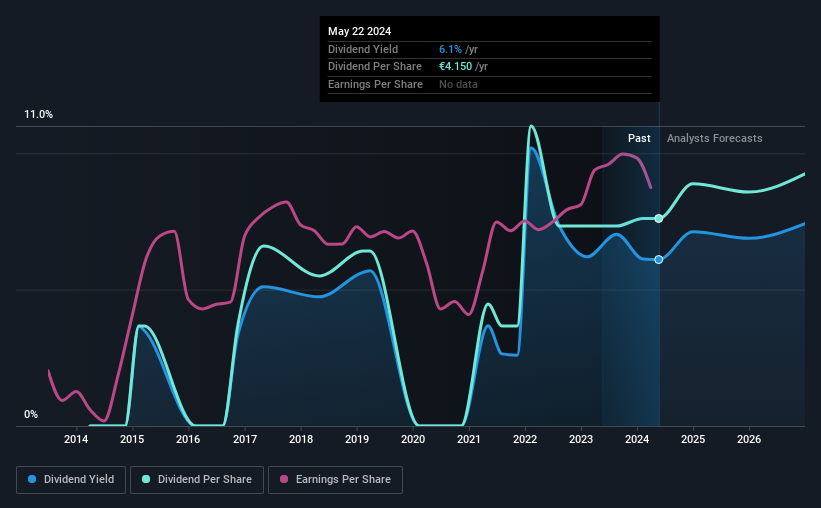KBC Group NV (EBR:KBC) Stock Goes Ex-Dividend In Just Three Days

KBC Group NV (EBR:KBC) stock is about to trade ex-dividend in 3 days. The ex-dividend date is one business day before the record date, which is the cut-off date for shareholders to be present on the company's books to be eligible for a dividend payment. The ex-dividend date is important as the process of settlement involves two full business days. So if you miss that date, you would not show up on the company's books on the record date. Thus, you can purchase KBC Group's shares before the 27th of May in order to receive the dividend, which the company will pay on the 29th of May.
The company's next dividend payment will be €0.70 per share, on the back of last year when the company paid a total of €4.15 to shareholders. Based on the last year's worth of payments, KBC Group has a trailing yield of 6.1% on the current stock price of €68.00. Dividends are a major contributor to investment returns for long term holders, but only if the dividend continues to be paid. So we need to check whether the dividend payments are covered, and if earnings are growing.
View our latest analysis for KBC Group
Dividends are usually paid out of company profits, so if a company pays out more than it earned then its dividend is usually at greater risk of being cut. KBC Group paid out more than half (58%) of its earnings last year, which is a regular payout ratio for most companies.
Generally speaking, the lower a company's payout ratios, the more resilient its dividend usually is.
Click here to see the company's payout ratio, plus analyst estimates of its future dividends.

Have Earnings And Dividends Been Growing?
Businesses with strong growth prospects usually make the best dividend payers, because it's easier to grow dividends when earnings per share are improving. If earnings fall far enough, the company could be forced to cut its dividend. With that in mind, we're encouraged by the steady growth at KBC Group, with earnings per share up 4.2% on average over the last five years.
Many investors will assess a company's dividend performance by evaluating how much the dividend payments have changed over time. KBC Group has delivered 8.4% dividend growth per year on average over the past nine years. It's encouraging to see the company lifting dividends while earnings are growing, suggesting at least some corporate interest in rewarding shareholders.
The Bottom Line
Is KBC Group worth buying for its dividend? Earnings per share have been growing at a reasonable rate, and the company is paying out a bit over half its earnings as dividends. We're unconvinced on the company's merits, and think there might be better opportunities out there.
If you're not too concerned about KBC Group's ability to pay dividends, you should still be mindful of some of the other risks that this business faces. In terms of investment risks, we've identified 1 warning sign with KBC Group and understanding them should be part of your investment process.
A common investing mistake is buying the first interesting stock you see. Here you can find a full list of high-yield dividend stocks.
Valuation is complex, but we're here to simplify it.
Discover if KBC Group might be undervalued or overvalued with our detailed analysis, featuring fair value estimates, potential risks, dividends, insider trades, and its financial condition.
Access Free AnalysisHave feedback on this article? Concerned about the content? Get in touch with us directly. Alternatively, email editorial-team (at) simplywallst.com.
This article by Simply Wall St is general in nature. We provide commentary based on historical data and analyst forecasts only using an unbiased methodology and our articles are not intended to be financial advice. It does not constitute a recommendation to buy or sell any stock, and does not take account of your objectives, or your financial situation. We aim to bring you long-term focused analysis driven by fundamental data. Note that our analysis may not factor in the latest price-sensitive company announcements or qualitative material. Simply Wall St has no position in any stocks mentioned.
About ENXTBR:KBC
KBC Group
Provides banking, insurance, and asset management services primarily for retail, private banking, small and medium sized enterprises, and mid-cap clients in Belgium, Bulgaria, the Czech Republic, Hungary, and Slovakia.
Adequate balance sheet average dividend payer.
Similar Companies
Market Insights
Community Narratives


